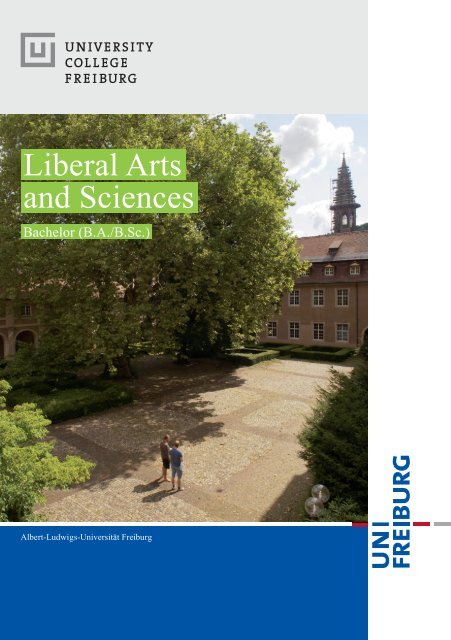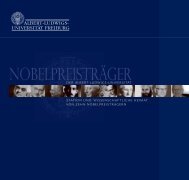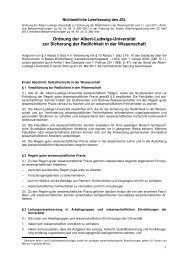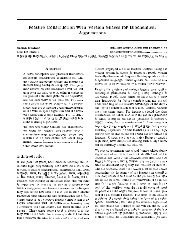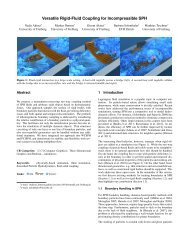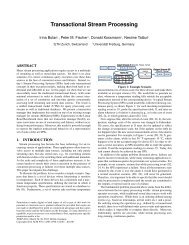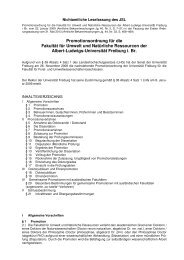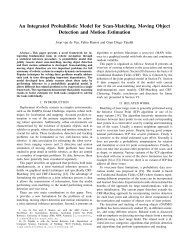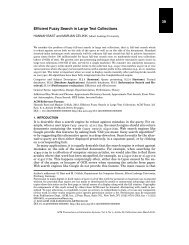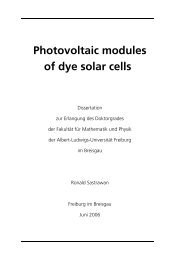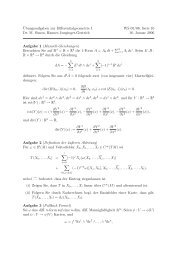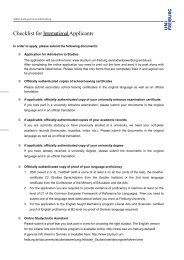Liberal Arts and Sciences - University College Freiburg - Universität ...
Liberal Arts and Sciences - University College Freiburg - Universität ...
Liberal Arts and Sciences - University College Freiburg - Universität ...
- No tags were found...
You also want an ePaper? Increase the reach of your titles
YUMPU automatically turns print PDFs into web optimized ePapers that Google loves.
3Welcome!The <strong>Liberal</strong> <strong>Arts</strong> <strong>and</strong> <strong>Sciences</strong> (LAS) Bachelor program at the <strong>University</strong> of <strong>Freiburg</strong>– the fi rst of its kind in Germany – is an exciting, groundbreaking venture. Developingour own specifi c perspective on a long tradition of <strong>Liberal</strong> Education in the UnitedStates <strong>and</strong> on recent highly successful interpretations of that tradition in the Netherl<strong>and</strong>s,we emphasize problem-orientation, student-centeredness <strong>and</strong> an internationaloutlook.Against the backdrop of a challenging <strong>and</strong> exciting period of transformation in Europeanhigher education, the idea of a LAS program in Germany, specifi cally in <strong>Freiburg</strong>,fi rst emerged several years back. With much enthusiasm <strong>and</strong> involvement a-cross faculties, we have since established our educational concept <strong>and</strong> founded the<strong>University</strong> <strong>College</strong> <strong>Freiburg</strong>, a platform for interdisciplinary teaching at the <strong>University</strong>of <strong>Freiburg</strong> <strong>and</strong> the host institution for the LAS program. We welcomed the fi rst generationof LAS students in October 2012.The <strong>University</strong> of <strong>Freiburg</strong> is especially suited to initiate a LAS program at a <strong>University</strong><strong>College</strong>: It is one of Germany’s leading research <strong>and</strong> higher education institutions<strong>and</strong> has a longst<strong>and</strong>ing tradition in interdisciplinary research <strong>and</strong> teaching. Furthermore,<strong>Freiburg</strong> is one of Germany’s most beautiful <strong>and</strong> agreeable cities, situated atthe heart of Europe, in direct proximity to both Switzerl<strong>and</strong> <strong>and</strong> France.The following pages will introduce you to the LAS program, its guiding ideas, organizingprinciples <strong>and</strong> intellectual emphases. Whether you are a potential student collectinginformation on study choices, an educator at another institution looking forideas, an academic contemplating co-operations, a student parent or a potentialbenefactor, we hope to be able to raise <strong>and</strong> keep your interest <strong>and</strong> answer the questionsyou might have about LAS at <strong>University</strong> <strong>College</strong> <strong>Freiburg</strong>.Prof. Dr. Bernhard Zimmermann,Dean of StudiesDr. Nicholas Eschenbruch,Director of Education
41. <strong>Liberal</strong> <strong>Arts</strong> <strong>and</strong> <strong>Sciences</strong> in BriefThe four-year Bachelor’s Degree in <strong>Liberal</strong><strong>Arts</strong> <strong>and</strong> <strong>Sciences</strong> is the <strong>University</strong>of <strong>Freiburg</strong>’s fi rst interdisciplinary, English-taughtundergraduate program <strong>and</strong>the fi rst of its kind in Germany. It is hostedby the <strong>University</strong> <strong>College</strong> <strong>Freiburg</strong><strong>and</strong> started in October 2012 with a pioneergroup of 78 students. Reaching a-cross academic fi elds, the LAS Bacheloris complementary to the <strong>University</strong>’sexisting disciplinary Bachelor programs.The program consists of four study areas:Website: www.ucf.uni-freiburg.de/go/areas
5The LAS program is mostly organized ina block schedule. This gives students<strong>and</strong> teachers the opportunity to engagevery closely with each other <strong>and</strong> the topicat h<strong>and</strong>. It also provides space for innovativeforms of instruction that characterizethe entire program.The LAS program is selective. Selectionplaces a strong emphasis on personalinterviews in order to assess the motivationof applicants <strong>and</strong> the matching betweenthe program <strong>and</strong> interested students.Its target group is students withhigh levels of intellectual curiosity, selfreliance<strong>and</strong> responsibility, who arelooking for problem-oriented work acrossdisciplines <strong>and</strong> are flexible <strong>and</strong> open tochallenges.The Core (66 ECTS points) constitutesthe intellectual identity of LAS at the <strong>University</strong>of <strong>Freiburg</strong>: All students are intensivelytrained in general academic skills(researching <strong>and</strong> presenting study material,effective writing, numerical literacyetc.). In order to put these skills into context<strong>and</strong> to exemplify the necessity <strong>and</strong>complexity of interdisciplinary thought<strong>and</strong> action, the first year of the programfocusses on contemporary societal challenges(such as Global Inequality, PublicHealth, Environmental Issues). In thehigher semesters of the Core Program,the students’ coursework is continuouslycomplemented by instruction in the theoryof science, knowledge <strong>and</strong> research.Finally, students follow a curriculum inresponsibility <strong>and</strong> leadership <strong>and</strong> havethe opportunity to engage in extracurricularactivities.The Language part of the program (36ECTS) ensures that all LAS students cancommunicate on academic topics in excellentEnglish <strong>and</strong> good German, <strong>and</strong>ideally acquire a good grounding in athird language.The Major (90 ECTS) constitutes thestudents’ thorough training in a specificacademic field of <strong>Sciences</strong> <strong>and</strong>/or theHumanities that is, in itself, interdisciplinary.It aims to provide sufficient depth tomake admission into disciplinary M.A. orM.Sc. programs possible.An Electives area of the curriculum (48ECTS) enables students to either pursueinterdisciplinary studies of their choice,engage in more practically oriented projectsor undertake specific additionaltraining necessary for admission intotheir chosen M.A. or M.Sc. programs.
62. Study Outline 2013Year 1Your fi rst, Foundational Year focusses onthe study of fundamental real-world problemsthat are characterized by boththeir current relevance <strong>and</strong> their inherentcomplexity. For the year 2012, for example,topics included: “Using <strong>and</strong> ProtectingNature”, “Transformation of Body<strong>and</strong> Mind”, “Migration, Culture <strong>and</strong> Community”.These topics introduce you tostudy questions from different perspec-tives <strong>and</strong>, at the same time, instruct youin core academic skills, such as research,writing <strong>and</strong> presentation. In additionto these broad foundational modules,you choose two modules, each ofwhich provide an introduction to one ofthe Majors. Finally, as during the followingyears, you have the opportunity todevelop your language skills accordingto your interests <strong>and</strong> your needs.Term: WinterTerm: SummerIntroduction to MajorsWebsite: www.ucf.uni-freiburg.de/go/preview
7Timetable for the academic year 2013/14While the schedule for the first year is pretty much set, the schedules on the followingpages are suggestions. They can <strong>and</strong> will be adjusted according to your interests <strong>and</strong>choices.
8Year 2In your second year, you begin to approachin greater depth the Major thatyou have chosen: you take modules thatintroduce you to the key questions, theories<strong>and</strong> methods of the field in which youconcentrate your studies. Further modulesfrom the Core program address fun-damental questions of scholarly knowledge,its origins, validity <strong>and</strong> role in theworld. Finally, you take two modules thatemphasize reflexive thought <strong>and</strong> responsibleaction inside <strong>and</strong> outside of academia.Term: WinterTheories of KnowledgeCulture <strong>and</strong>CommunicationTerm: Summer
9Year 3In your third year, choice becomes moreprominent. First, you have the importantchoice to spend all or parts of this year ata university abroad. Second, concerningyour Major, you can choose from a rangeof different modules, according to yourinterests <strong>and</strong>, possibly, graduate programsthat you envisage. Choice is alsocharacteristic for the Electives in yourthird year. You can take modules at anyof the faculties of the university or do anextended internship. You thereby havethe opportunity to shape for yourselfwhat your degree in <strong>Liberal</strong> <strong>Arts</strong> <strong>and</strong> <strong>Sciences</strong>is about.Term: WinterAnthropology <strong>and</strong> ExperienceTerm: SummerInterdisciplinary Project
10Year 4In the fourth year, you continue to personalizeyour curriculum. You can takefurther, more specialized modules inyour field or even work on a specific projectunder the supervision of a senior researcher.In your B.A./B.Sc. thesis at theend of the final year, you produce a substantialpiece of your own research. Thisconcentration in <strong>and</strong> on your Major is,again, complemented by your choice ofElectives appropriate to the level ofscholarship that you have reached bythen. In addition, you take two furthermodules in the Responsibility <strong>and</strong> Leadershipcurriculum, preparing you for professional<strong>and</strong> civic life after graduation.Term: WinterVision <strong>and</strong>LeadershipTerm: SummerB.A./B.Sc. ThesisB.A./B.Sc. Thesis
113. The <strong>Liberal</strong> <strong>Arts</strong> <strong>and</strong> <strong>Sciences</strong> Program3.1 Core ProgramRegardless of the Major you choose, allstudents participate in the Core Program,a characteristic feature of the <strong>Freiburg</strong>LAS degree. Focusing on currentglobal challenges, it merges the students’training in personal skills, researchmethods <strong>and</strong> general epistemologyinto a comprehensive framework thathas social applicability, intellectual depth<strong>and</strong> personal relevance.The Core Program consists of three parts:The Foundational Program takes complexglobal challenges as referencepoints for a h<strong>and</strong>s-on introduction to <strong>Liberal</strong><strong>Arts</strong> <strong>and</strong> <strong>Sciences</strong>. They give skillsclasses a challenging topical focus. Togetherwith language training, the FoundationalProgram makes up the fi rstyear’s classwork <strong>and</strong> ensures that students’start into academic life with LAS isboth stimulating <strong>and</strong> structured.Foundational Program (5 modules):LAS: Backgrounds, Ideas, ChallengesExploring Complex ProblemsSharing KnowledgeNumerical LiteracyInterdisciplinary ProjectsWebsite: www.ucf.uni-freiburg.de/go/core
12The Epistemology Lectures are two centralmodules towards the middle of theprogram. At the intellectual heart of LAS,they tackle the questions what knowledgeis, how it is generated in the sciences<strong>and</strong> humanities, how it affects theworld <strong>and</strong> is affected by it. They aretaught by two professorships for Epistemology<strong>and</strong> Science Studies that havebeen specifically established for the LASprogram.Epistemology Lectures (2 modules):LAS Core Lecture: Theories of KnowledgeLAS Core Lecture: Contexts of KnowledgeThe Curriculum in Responsibility <strong>and</strong>Leadership extends over the Core program’slater semesters <strong>and</strong> is designedto inspire <strong>and</strong> equip students to effectivelyengage with the challenges theywill face after graduation. It prompts studentsto consider their own position inthe world, to think about their responsibility<strong>and</strong> personal vision in life <strong>and</strong> to acquirethe skills they need in order toreach their goals. Classes combine rigorousacademic input with personal reflection<strong>and</strong> training in more experientialformats.Responsibility <strong>and</strong> Leadership (4 modules):Anthropology <strong>and</strong> ExperienceAction <strong>and</strong> ResponsibilityVision <strong>and</strong> LeadershipCulture <strong>and</strong> Communication
133.2 Electives (8 modules)The credits these modules represent canbe used quite freely: for attending modulesin other Majors, for more languagetraining, for meeting specific M.A./ M.Sc.requirements, for an extended period a-broad, or for a practical project or internship.3.3 Language (6 modules)The Language part of the program enables you to reach an excellent level in academicEnglish <strong>and</strong>, when necessary, a good level of German. Further language optionsare available.Websites: www.ucf.uni-freiburg.de/go/electiveswww.ucf.uni-freiburg.de/go/language1
143.4 MajorsMajor: Culture <strong>and</strong> HistoryIn the Major Culture <strong>and</strong> History, we studythe arts, philosophies, religions, languages,<strong>and</strong> histories of peoples fromaround the world <strong>and</strong> through time.Broadly speaking, this Major covers thetraditional humanities disciplines in anuntraditional, interdisciplinary way.We believe that the study of culture is notjust a specialized activity of scholars, butrather is something that people do all thetime. When, for example, you argueabout the meaning of a new slang word,when you discuss the merits of a politicalparty, or when you ask yourself whatmatters most to you, you are informallystudying language, history, or philosophy.In Culture <strong>and</strong> History, we give rigor tothese debates, discussions, <strong>and</strong> reflectionsby inquiring into the relationshipbetween particular cultural forms <strong>and</strong>general human problems, by putting ourown identities <strong>and</strong> commitments underscrutiny, <strong>and</strong> by opening ourselves tolearning about other peoples <strong>and</strong> otherWebsite: www.ucf.uni-freiburg.de/go/major1times. We ask questions, for instance,about specific objects. What makessomething an artwork <strong>and</strong> is it reallydifferent from other forms of humancreation, like technical ones? When westudy an artwork, what can we learnabout the culture <strong>and</strong> time period thatproduced it? What do we learn aboutourselves in the process? In what waysdo artworks engage in politics? How arethe past, the present, <strong>and</strong> the futurebound together by our efforts to underst<strong>and</strong>cultural artefacts from anothertime or place?We also ask broader questions that linkour study of objects to social <strong>and</strong> politicalchallenges. What are the limits of underst<strong>and</strong>inganother culture or anothertime? Is there a responsible way to criticizeaspects of someone else’s culture?How are personal identities enmeshed incommunities, cultures, <strong>and</strong> histories? Inwhat sense are individuals responsibleto or for the histories that define their wayof life?
15In addressing these <strong>and</strong> related questions,we work in forms of knowledge thatare largely interpretive: the processing<strong>and</strong> reprocessing of cultural artefacts,the framing of strong questions, <strong>and</strong> thedevelopment of coherent lines of analytic<strong>and</strong> synthetic argumentation. As you studythese ways of knowing, you are challengedto think carefully <strong>and</strong> preciselyabout specific works (novels, paintings,films, philosophical treatises, politicalmanifestos, theoretical reflections, <strong>and</strong>so on) while also asking bigger questionsabout their meaning. Culture <strong>and</strong> Historygives you a strong foundation in humanisticacademic disciplines – history, arthistory, anthropology, literary studies,philosophy, <strong>and</strong> religious studies, amongothers – while allowing you to pursueyour own intellectual passions in a contextof critical reflection.For more information about this Major,please contact Dr. Ryan Plumley at ryan.plumley@ucf.uni-freiburg.deMajor: Methods (2 modules)Culture as a Topic of Academic InquiryHistory as a Topic of Academic InquiryMajor: Topics (6 modules)One module in each area of choice:Area 1: Culture <strong>and</strong> History up to the Early Modern PeriodArea 2: Culture <strong>and</strong> History after the Early Modern PeriodArea 3: Sociocultural Anthropology or Area StudiesArea 4: A further module from areas 1.-3.Area 5: A further module from areas 1.-3.Area 6: Contemporary Art or Literature or Music or AestheticsWithin the areas of choice, modules focus on more specific topics, <strong>and</strong> several optionsmay be available in each area.Major: Special Topics (2 modules)2 specialized modulesTwo specialized modules have a direct link to current research <strong>and</strong> enable you to workclosely with a senior academic teacher.Bachelor ThesisIn their Bachelor thesis, students work closely on one specific scientific topic from theirMajor.
16Major: Life <strong>Sciences</strong>The Major in Life <strong>Sciences</strong> gives you thebasics you need to know about living organisms<strong>and</strong> their interaction with surroundingenvironments while at the sametime taking a broader perspective on thisfield of knowledge <strong>and</strong> its role in society,politics, <strong>and</strong> culture. The Major emphasizesquestions about the human being,but also includes the interaction of biological<strong>and</strong> technical systems. To this end,we consider the human being as a researchingsubject as well as the subjectof research.Throughout the program we tackle questionsof general interest using elementaryquestions of the Life <strong>Sciences</strong>: Are themind <strong>and</strong> the body separate entities orare they inextricably linked to eachother? How does consciousness emergefrom the large aggregation of cells formingthe human brain? Is a larger biologicalsystem more than the sum of itsparts? To what extent is behavior determinedby genes, <strong>and</strong> how much is it influencedby the environment? Is the extensionof our body with technical prosthesespart of the evolutionary process? Howdoes the interaction with technical systemsshape our way of life? Why are theLife <strong>Sciences</strong> so prominent in sciencefiction literature? What are the risks <strong>and</strong>benefits of a society in which humans<strong>and</strong> robots interact?We approach such questions primarilyfrom the perspective of disciplines likeBiology, Neuroscience, Cognitive Science,Medicine, <strong>and</strong> Biotechnology, butalso discuss them in a broader context.Starting from a single cell, a biochemicalsystem in itself, we deal with larger-scalesystems like cell clusters, bodily organs<strong>and</strong> the body <strong>and</strong> mind of the humanbeing as a whole. Studying these systemsbrings us to questions about howcognition <strong>and</strong> emotions are realized biologically<strong>and</strong> how biological systems canbe connected to technical ones, for examplefor medical purposes.The Major in Life <strong>Sciences</strong> gives you astrong research-oriented foundation inthe natural sciences <strong>and</strong> relates thisWebsite: www.ucf.uni-freiburg.de/go/major2
17foundation to challenging topics for thesociety of the 21st century. It is, however,not intended as a pre-med program.For more information about this Major,please contact Dr. Simon J. Büchner atbuechner@ucf.uni-freiburg.deMajor: Methods (2 modules)Empirical <strong>and</strong> Experimental MethodsMathematics <strong>and</strong> Physics for <strong>Liberal</strong> <strong>Arts</strong> <strong>and</strong> <strong>Sciences</strong>Major: Topics (6 modules)Compulsory modules for the “Life <strong>Sciences</strong>” Major:BiochemistryPhysiologyCell BiologyData Processing <strong>and</strong> Modeling for the Life <strong>Sciences</strong>Two modules from the following areas:Area 1: NeurosciencesArea 2: GeneticsArea 3: Biological AnthropologyArea 4: BiotechnologyArea 5: Electronic Engineering for Biology <strong>and</strong> MedicineArea 6: Mechanical Engineering for Biology <strong>and</strong> MedicineWithin the areas of choice, the later modules focus on more specific topics, <strong>and</strong> severaloptions may be available in each area.Major: Special Topics (2 modules)2 specialized modulesTwo specialized modules have a direct link to current research <strong>and</strong> enable you to workclosely with a senior academic teacher.Bachelor ThesisIn their Bachelor thesis, students work closely on one specific scientific topic from theirMajor.
18Major: Earth <strong>and</strong> Environmental <strong>Sciences</strong>Earth <strong>and</strong> environmental issues are subjectto diverse political debates <strong>and</strong> arebroadly discussed in the media. Becausethese issues are enormously complicated,they spawn a range of challengingquestions. Take climate change: Whatcauses global warming? Is it man-madeor part of larger pattern of climate developments?How does it affect humancommunities <strong>and</strong> their prospects for thefuture? Or take the related issue of biodiversity:Are we moving towards the nextmass extinction event? Will it actuallymatter if some species go extinct? Howcan we value diversity <strong>and</strong> what wouldbe its currency? Or, thirdly, take the exampleof new technologies: Can a geneticallymodified crop help sustain the environmentby, for example, reducing theneed for insecticides? Or are modificationsof natural systems inherently dangerousto the delicate balance of ecosystems?More generally, how can humanbeings use nature in an efficient but sustainablemanner?Since environmental issues involve differentkinds of processes, these topicsrequire an interdisciplinary approach.Within the Major Earth <strong>and</strong> Environmental<strong>Sciences</strong> you investigate our planetprimarily from three perspectives: 1) ascientific underst<strong>and</strong>ing of the physicalplanet, 2) a biological underst<strong>and</strong>ing oflife on the planet, 3) an underst<strong>and</strong>ing ofthe chemical interplay between physical<strong>and</strong> biological systems on Earth <strong>and</strong> inthe environment.You do not only study our planet’s currentstate, but also its history. An explorationof the origin of our planet <strong>and</strong> theorigin of life provides you a chronologicalpicture of natural <strong>and</strong> anthropogenic environmentalchanges <strong>and</strong> helps you toevaluate the potentially disastrous changeswe face today. As part of this historicalapproach, you also learn about themethods used to gain information aboutthe Earth’s deep past, the reliability ofsuch methods, <strong>and</strong> the potential usefulnessof such information for current policydebates.Website: www.ucf.uni-freiburg.de/go/major3
19These debates, surrounding issues likethe ones mentioned above, dem<strong>and</strong> presentsolutions. We human beings aresustained by our environment, but we donot always sustain it in return.Finally, environmental issues, groundedin an underst<strong>and</strong>ing of the Earth’s past<strong>and</strong> addressed to the concerns of thepresent, are in many ways questionsabout the future, both of the planet <strong>and</strong> ofits human habitation. We need to be ableto assess them scientifically <strong>and</strong> developstrategies to tackle them. The MajorEarth <strong>and</strong> Environmental <strong>Sciences</strong> givesyou the scientific basis to follow, evaluate,<strong>and</strong> contribute scientifically to current<strong>and</strong> future debates.For more information about this Major,please contact Dr. Karin Moll at karin.moll@ucf.uni-freiburg.deMajor: Methods (2 modules)Observing NatureMathematics <strong>and</strong> Physics for <strong>Liberal</strong> <strong>Arts</strong> <strong>and</strong> <strong>Sciences</strong>Major: Topics (6 modules)Compulsory modules for the “Earth <strong>and</strong> Environmental <strong>Sciences</strong>” Major:ChemistryEarth <strong>Sciences</strong>EcologyModules from the following areas:Area 1: The Evolution of our Planetary SystemArea 2: The Global Circulation of Matter, Substances <strong>and</strong> MaterialsArea 3: Health <strong>and</strong> the EnvironmentWithin the areas of choice, the later modules focus on more specific topics, <strong>and</strong> severaloptions may be available in each area.Major: Special Topics (2 modules)2 specialized modulesTwo specialized modules have a direct link to current research <strong>and</strong> enable you to workclosely with a senior academic teacher.Bachelor ThesisIn their Bachelor thesis, students work closely on one specific scientific topic from theirMajor.
20Major: GovernanceIs the financial crisis a political or an economicproblem? What is the role ofNGOs in global governance? Are politicalparties outdated? Do we need moreEurope? Does it still make sense tospeak of Left <strong>and</strong> Right in politics? C<strong>and</strong>emocracy <strong>and</strong> expert advice go h<strong>and</strong> inh<strong>and</strong>? Can public administration be managedlike a company? Is there a newsocial question? How can commongoods be organized? Are we beyond thenation-state? Is democratization of countriesfrom the outside democratic? Questionslike these are at the heart of theMajor Governance.This Major is embedded in the social sciences,such as political science, sociology,economics, <strong>and</strong> legal studies. Itsspecific focus, Governance, is on howwe, as human beings, deal with commonproblems. How <strong>and</strong> by whom are suchproblems identified? By which institutions(like markets, states, public-privatepartnerships) <strong>and</strong> which means (like policies,hard <strong>and</strong> soft law, public communication)are these problems addressed?What conflicts <strong>and</strong> disputes are entailedin such problem solving? Our approachto these key questions have the followingcharacteristics: 1) a historical perspective– how all of these problems <strong>and</strong> institutionschange over time, in particularhow we can underst<strong>and</strong> the currentchanges; 2) a focus on the interpretations,justifications <strong>and</strong> arguments givenby social <strong>and</strong> political actors; 3) the investigationof current practical politicalproblems with a reflection on fundamentalconceptual questions. Finally, the programputs specific emphasis on phenomena<strong>and</strong> problems with a Europe<strong>and</strong>imension.If you opt for Governance as your Major,you take modules in your second yearthat introduce you to both key conceptsof knowledge about the social <strong>and</strong> politicalworld (e.g., analytical, evaluative,practical) as well as to the key methodologies(interpretative, qualitative, quantitative)used in their study. Building onthis, you can choose from a range ofmodules, many of which combine severalWebsite: www.ucf.uni-freiburg.de/go/major4
21social science disciplines as well as insightsfrom the Humanities, such as: Law<strong>and</strong> Society; War <strong>and</strong> Images; ClimateChange <strong>and</strong> Global Justice; Culture <strong>and</strong>Conflict. Even more importantly, you willbe prepared to underst<strong>and</strong> crucial currentproblems <strong>and</strong>, on this basis, to makerelevant <strong>and</strong> insightful contributions todealing with them.For more information about this Major,please contact Dr. Volker Balli at volker.balli@ucf.uni-freiburg.deMajor: Methods (2 modules)Theoretical Foundations <strong>and</strong> Interpretative Methods in the Social <strong>Sciences</strong>Empirical Methods in the Social <strong>Sciences</strong>Major: Topics (6 modules)Area 1: Comparative GovernmentArea 2: Law <strong>and</strong> AdministrationArea 3: EconomicsArea 4: a further module from areas 1.-3.Area 5: a further module from areas 1.-3.Area 6: a further module from areas 1.-3., or from sociology, political theory,public management, political ethics or business ethicsWithin the areas of choice, modules focus on more specific topics, <strong>and</strong> several optionsmay be available in each area.Major: Special Topics (2 modules)2 specialized modulesTwo specialized modules have a direct link to current research <strong>and</strong> enable you to workclosely with a senior academic teacher.Bachelor ThesisIn their Bachelor thesis, students work closely on one specific scientific topic from theirMajor.
224. Questions <strong>and</strong> AnswersQ: What is the <strong>Freiburg</strong> “<strong>Liberal</strong> <strong>Arts</strong> <strong>and</strong> <strong>Sciences</strong>” program about?A: LAS is the fi rst four-year, English-taught undergraduate program of its kind at aGerman university. It is an interdisciplinary alternative to existing B.A. or B.Sc. degreeprograms. It teaches its students to think across academic disciplines, look atproblems from a variety of scientifi c perspectives <strong>and</strong> become effective communicators<strong>and</strong> leaders.Q: What type of student is LAS aimed at?A: The LAS program is aimed at students with broad academic interests who arealready starting to formulate their own questions. We are looking for applicants whovalue academic rigor <strong>and</strong> in-depth study, but would also like to give their studies anindividual emphasis. If, on top of that, you enjoy new horizons <strong>and</strong> unexpected challenges,appreciate an international, hard-working <strong>and</strong> inspiring environment <strong>and</strong> areready <strong>and</strong> willing to take on responsibility for yourself <strong>and</strong> others, LAS is probably foryou.Q: Does interdisciplinarity mean I can study anything? Isn’t that a bit arbitrary?Will I learn anything concrete for my later career?A: Range <strong>and</strong> choice are important for the <strong>Liberal</strong> <strong>Arts</strong> <strong>and</strong> <strong>Sciences</strong>, but the programis not arbitrarily structured: We strike a balance between your choice of subjects <strong>and</strong>our conviction that there are things all LAS students need to learn. Regarding thecontent of the Core Program <strong>and</strong> the extent of the Language training, you have littlechoice; also, we expect you to focus your Major in one of four areas of academicenquiry: Life <strong>Sciences</strong>, Governance, Culture <strong>and</strong> History or Earth <strong>and</strong> Environmental<strong>Sciences</strong>. However, within each area <strong>and</strong> especially in your electives, you have awider range of topics <strong>and</strong> modules than you would have in a disciplinary B.A./B.Sc.program.Website: www.ucf.uni-freiburg.de/go/qa
23Q: Originally, “<strong>Liberal</strong> <strong>Arts</strong> <strong>and</strong> <strong>Sciences</strong>” seems to be a North American tradition.Is the <strong>Freiburg</strong> LAS program comparable to the North American <strong>Liberal</strong><strong>Arts</strong> <strong>College</strong>s?A: We share with the North American colleges an emphasis on a broad curriculum,m<strong>and</strong>atory training in skills like effective writing, numerical literacy <strong>and</strong> public speaking,<strong>and</strong> the education of the whole person. There are also important differences:(1) We go directly into academic training, while many US programs spend considerabletime on the general education most Europeans are expected to get in highschool; (2) LAS in <strong>Freiburg</strong> is a small, non-residential program that offers studentsthe chance to fully integrate themselves into the city <strong>and</strong> the <strong>University</strong> of <strong>Freiburg</strong>– one of the leading research universities in Germany with 11 faculties <strong>and</strong> 24,000students. LAS in <strong>Freiburg</strong> thus has a very different atmosphere from the larger, residentialcolleges elsewhere.Q: I heard there are already some well established <strong>Liberal</strong> <strong>Arts</strong> programs inEurope, e.g. in the Netherl<strong>and</strong>s. Why should I choose <strong>Freiburg</strong>?A: For Europe, the Dutch LAS programs have been groundbreaking <strong>and</strong> most of themare very good; we are proud to count <strong>University</strong> <strong>College</strong> Maastricht amongst ourpartner institutions. The few LAS programs that exist in Europe all have differingemphases <strong>and</strong> strengths. The <strong>Freiburg</strong> program stresses (1) theory of knowledge <strong>and</strong>research, across subjects, (2) language skills <strong>and</strong> culture, (3) responsibility <strong>and</strong> leadership.We have a strong compulsory “Core Program” <strong>and</strong> a little less emphasis onindividual choice than some of the Dutch programs. You should research them allwell to see what suits you best.Q: Is LAS an elite program?A: LAS at the <strong>University</strong> of <strong>Freiburg</strong> is selective; we expect above-average grades,above average intellectual curiosity <strong>and</strong> an above average readiness to accept responsibilityfor yourself <strong>and</strong> others. This is because we want you to take on aboveaverage challenges in your life once you graduate.
24Q: The st<strong>and</strong>ard German Bachelor’s degree takes three years. Why does LAStake four?A: We have a clear idea about the general academic competencies, language skills<strong>and</strong> intellectual abilities we would like you to have. On top of that, we want you to builda sound academic specialization <strong>and</strong> to have room for your own choices <strong>and</strong> projects.It’s a well-rounded education that takes four years.Q: I already know I like one subject a lot more than others. Is LAS still good forme?A: LAS is not a normal Bachelor’s degree taught in English with a little extra skillstraining. It is a different educational approach emphasizing interdisciplinary thinking.A B.Sc. in Physics will obviously give you more exposure to Physics, a B.A. in Historywill give you more History. So, if you are looking to get maximum immersion in onesubject, you should choose an according program. If you are interested in academicinquiry across disciplines, you should consider LAS.Q: I am not sure what I would like to study. Will LAS give me the opportunityat least to start studying something <strong>and</strong> help me make up my mind later on?A: LAS in <strong>Freiburg</strong> is clearly not designed as a course of general education <strong>and</strong> academicorientation, <strong>and</strong> it will not be an easy course to follow. Rather, you will start towork on complex interdisciplinary challenges right from the beginning. Later on, makingyour own study choices will continuously dem<strong>and</strong> that you make clear decisions<strong>and</strong> take responsibility for them. If you find that difficult already, you should considercarefully if LAS is really for you.
25Q: What is the <strong>University</strong> of <strong>Freiburg</strong> like? How is LAS integrated into it?A: The <strong>University</strong> of <strong>Freiburg</strong> was founded in 1457. It is a research university with 11faculties, covering the whole spectrum of subjects, from Philosophy <strong>and</strong> Theology toEngineering <strong>and</strong> Computer Science. It has repeatedly achieved highest ranks innationwide competitions in the areas of research, teaching <strong>and</strong> continuing education.You could hardly find a better institutional context for a LAS program. And while thevast majority of LAS modules are specifically created for <strong>and</strong> administered by theprogram, you will, at the same time, be a regular student of the university: you will beable to attend talks <strong>and</strong> lectures, use central facilities like the university library, participatein the university sports program or join any number of student societies <strong>and</strong>activities.Q: Sounds great – but is <strong>Freiburg</strong> also a good place to live, beyond the university?A: Yes! <strong>Freiburg</strong> is widely considered one of the most attractive mid-size cities inGermany. It has a charming historical setting, a pleasantly mild climate, <strong>and</strong> the BlackForest is in easy reach by public transport for hiking in summer <strong>and</strong> skiing in winter.<strong>Freiburg</strong> has an open-minded atmosphere <strong>and</strong> a lively cultural scene. A lot of studentschoose <strong>Freiburg</strong> for its close-knit university community. Finally, as a “GreenCity”, it is especially noted for its strengths in ecology <strong>and</strong> sustainability. At the sametime, European metropolitan centers like Zurich, Frankfurt <strong>and</strong> Strasbourg are allwithin a two-hour train ride, while Paris, Milan <strong>and</strong> the Mediterranean make for convenientweekend destinations. France is just a twenty minute drive away, Switzerl<strong>and</strong>only a little more, so we are truly at the heart of Europe.
26Q: The <strong>Freiburg</strong> LAS program started in autumn 2012. Is it not a little risky tobe amongst the first generations in a new program?A: Yes, in some sense it is. Modules <strong>and</strong> procedures are being developed <strong>and</strong> improved,<strong>and</strong> occasional misunderst<strong>and</strong>ings <strong>and</strong> challenges will probably come up. However,joining a new program is also a unique opportunity. Later generations will nothave such an influence on the future of the program: we will continuously monitor ourfirst students’ experiences <strong>and</strong> progress <strong>and</strong> listen closely to feedback. Finally, wecan rely on the many resources of a large <strong>and</strong> prestigious university <strong>and</strong> on the greatenthusiasm our initiative is generating. So, while we cannot deny some risk, it correspondswith great opportunities, <strong>and</strong> great opportunities are always a little risky. Bea pioneer <strong>and</strong> join us on this exciting trip!Q: How does the selection process work?A: Selection is competitive, based on academic merit <strong>and</strong> personal motivation. Academicmerit is represented by the over-all grade of your German higher educationentrance qualification (Abitur) or an officially recognized equivalent. Also, you needto provide proof of English at the B2 level of the CEFR scale (Common EuropeanFramework of Reference for Languages). We then interview you in person, in English,<strong>and</strong> modify the initial grade in the light of your personal aptitude for the program <strong>and</strong>other achievements such as volunteer service or a stay aboard. SATs or similar testsare not relevant to the process.
27Q: What do international applicants have to consider?A: There are some significant differences from application processes in the Englishspeakingworld which you must bear in mind. Most of all, international applicants aswell as German applicants with non-German qualifications need to make sure wellin advance that their qualifications are considered equivalent to the German “Abitur”.Here, nationwide legal regulations apply which we cannot overrule. Only once youmeet these requirements will you be allowed to enter the LAS selection process itself.Refer to our website (www.ucf.uni-freiburg.de/go/application) for further informationor enquire at the university department for International Admissions (www.ucf.unifreiburg.de/go/qualification).Q: Do I need to know German in order to apply?A: No. We want to attract applicants from all over the world who are interested in LASregardless of their language <strong>and</strong> cultural background. However, you are expected tostudy German <strong>and</strong> to pass an exam equivalent to at least A2 on the CEFR scale afteryour second year. Coursework designed to prepare you for that exam is part of theprogram, <strong>and</strong> you are encouraged to study German to a higher st<strong>and</strong>ard as part ofyour language options.Q: I am already studying something else – can I join the LAS program in ahigher semester?A: If you meet the requirements which are laid out in the Rules <strong>and</strong> Regulations(www.ucf.uni-freiburg.de/go/stupo) <strong>and</strong> if there is free capacity, you can apply. However,since we are currently focusing on our first cohort of regular students, we do notencourage you to transfer into LAS from another degree program right now, as youwould face complicated issues of cross-semester scheduling <strong>and</strong> credit recognition,possibly prolonging your studies.
28Q: During the LAS program in <strong>Freiburg</strong>, will I have the opportunity to studyabroad?A: The <strong>University</strong> of <strong>Freiburg</strong> has a broad range of exchange programs with partnersall over the world. These are, of course, open to LAS students. UCF will help you toorganize a semester or a year abroad via one of these programs, especially concerningpreparation, integration into your LAS curriculum <strong>and</strong> credit recognition. Beyondexisting, university-wide exchange programs, UCF is currently establishing structuredexchanges with our two closest partner institutions: <strong>University</strong> <strong>College</strong> Maastricht,the leading <strong>University</strong> <strong>College</strong> in the Netherl<strong>and</strong>s, <strong>and</strong> Schreyer Honors <strong>College</strong>,a program for especially talented <strong>and</strong> dedicated students at Penn State<strong>University</strong> in the USA. More co-operations will be established in the coming years.The LAS Electives area, which plays a key role in the program’s second <strong>and</strong> thirdyears, is especially suited for studying or doing an internship abroad.Q: Do you charge tuition fees?A: There are no tuition fees apart from a registration fee every semester. In mostGerman federal states <strong>and</strong> at almost all of our top universities even top-level highereducation is considered a service the German state provides.Q: Do you offer scholarships?A: At present, we are unfortunately not in a position to offer scholarships locally. Youmay inquire at the German Academic Exchange Service to find out if you are eligiblefor scholarships from other sources.
29Q: Finally, what can I do with a LAS degree later on? What academic <strong>and</strong> professionaloptions will I have?A: While we do not know what you will do with your LAS degree, we can give youinformation on what others are doing. As there is not much experience with LASgraduates in Germany yet, here’s an overview of the situation elsewhere:Concerning entrance into specialized disciplinary M.A. or M.Sc. programs, your Major(90 ECTS points) will provide you with a lot of possibilities, especially if you enquireearly on which admission criteria you need to meet: By planning ahead, you willhave the possibility to work towards those criteria in your electives (48 ECTS). Becauseof the intellectual versatility we aim to train you in, we expect our students toget into top schools once they graduate (<strong>and</strong> the Dutch programs prove that this isrealistic), but of course we cannot guarantee admission into every M.A. or M.Sc.program.LAS graduates often pursue successful careers in academia. In an essay in Councilon Undergraduate Research Quarterly from 2001, Donald Kennedy (professor ofbiology, former president at Stanford <strong>University</strong> <strong>and</strong> editor of Science) observed thatLAS graduates end up doing a PhD far more often than graduates from top researchuniversities such as Harvard or Yale – <strong>and</strong> this is true even for the natural sciences.Concerning the situation on the job market outside academia in the USA, the Associationof American <strong>College</strong>s <strong>and</strong> Universities (AAC&U) has repeatedly conductedsurveys amongst employers as well as students <strong>and</strong> published policy papers on careeropportunities for LAS graduates. If these results hold true for Europe as well,then there is a clear dem<strong>and</strong> for graduates trained in interdisciplinary thought <strong>and</strong>action.The experience at <strong>University</strong> <strong>College</strong> Maastricht indicates that a large percentage ofgraduates continue with a M.A. or M.Sc. program. At <strong>University</strong> <strong>College</strong> <strong>Freiburg</strong> aswell, the curriculum is structured in such a way to – with our support – enable entranceinto disciplinary Master programs in the areas of our Majors <strong>and</strong> obviously intointerdisciplinary ones as well.
30All this has not gone unnoticed in Germany. Time <strong>and</strong> again, the Confederation ofGerman Employers‘ Associations (BDA) has pointed out the importance of interdisciplinarytraining. This was seconded in 2010 by the German Council of Science <strong>and</strong>Humanities (Wissenschaftsrat; the most important advisory body for higher educationpolicy) that called for <strong>University</strong> <strong>College</strong>s at German universities. This is not idletalk. Business <strong>and</strong> employers’ associations have supported our LAS program in <strong>Freiburg</strong>from the first funding application in 2009 up to today <strong>and</strong> are keen on getting toknow our graduates!These opportunities <strong>and</strong> success stories are based on the facts that (1) scientific <strong>and</strong>societal challenges reach beyond academic disciplines <strong>and</strong> structures; (2) LAS givesstudents key qualifications for today’s dynamic <strong>and</strong> international job market: Graduateswill have learnt how to learn, will be culturally <strong>and</strong> intellectually highly flexible aswell as socially <strong>and</strong> personally responsible while having a sound grounding in a specificacademic field. As Marijk van der Wende, professor of Higher Education at theFree <strong>University</strong> Amsterdam, stated in her 2011 paper on The Emergence of <strong>Liberal</strong><strong>Arts</strong> <strong>and</strong> <strong>Sciences</strong> Education in Europe, it’s all about “the deeper need for genericskills, flexibility <strong>and</strong> interdisciplinarity required for innovation, a key factor for the successof a knowledge economy.”In summary, LAS students are prepared for work responsibilities <strong>and</strong> careers in internationalenvironments that dem<strong>and</strong> fast <strong>and</strong> efficient adaptation to varying <strong>and</strong>complex challenges on a day to day basis. Universities, research institutions, thinktanks, international organizations, politics <strong>and</strong> administration, media as well as internationalfirms are all potential employers.So, while career path for LAS graduates may not be as clear-cut as they are for thosewho read Medicine, Law or Economics, studying LAS in <strong>Freiburg</strong> will provide you withmany prerequisites necessary for your specific career goals. The most importantingredient, however, is you: LAS gives you the freedom to shape your own education– it also challenges you to use that freedom to set out towards career goals that,ultimately, only you yourself can define.
31Q: Do you have more questions?Contact us: studyinfo@ucf.uni-freiburg.de„We are not students of some subject matter, but students of problems. Andproblems may cut right across the borders of any subject matter or discipline.“Karl PopperAs of February 2013
<strong>University</strong> <strong>College</strong> <strong>Freiburg</strong><strong>University</strong> of <strong>Freiburg</strong>Bertoldstraße 1779085 <strong>Freiburg</strong>, GermanyTel. +49 761 203-67342studyinfo@ucf.uni-freiburg.deFor more information, pleasevisit www.ucf.uni-freiburg.de<strong>and</strong> join us on Facebook or Google +Printed with kind support by Baden-Badener UnternehmergesprächeAlbert-Ludwigs-Universität <strong>Freiburg</strong>


